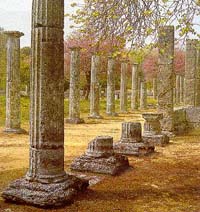When did the ancient games begin and when did they end?
[ 2006-03-14 18:35 ]
| 古代奥运会辉煌近千年,最后在公元4世纪末落下帷幕。历史中断了,直到19世纪现代奥运会的兴起,它再次绽放辉煌。 |
|
|
 Legends obscure the
origins of the games, so placing any certain date on the start of the
contest is impossible. Even our earliest sources hold the festival in the
highest regard, suggesting the games were quite ancient. Pausanias
says: Legends obscure the
origins of the games, so placing any certain date on the start of the
contest is impossible. Even our earliest sources hold the festival in the
highest regard, suggesting the games were quite ancient. Pausanias
says:
Later on Iphitus, ... arranged the games at Olympia and reestablished
afresh the Olympic festival and truce, after an interruption of uncertain
length. ... At this time Greece was grievously worn by internal strife and
plague, and it occurred to Iphitus to ask the god at Delphi for
deliverance from these evils. The story goes that the Pythian priestess
ordained that Iphitus himself and the Eleans must renew the Olympic games.
(Pausanias 5.4.5-6)
Most historians date Iphitos (Iphitus) to some time in the ninth
century B.C.
The first recorded Olympic victor was Koroibos of
Elis, traditionally dated to 776 B.C. Historical records and documents
have preserved a long list of subsequent Olympic victors. Greek historians
later used number of the Olympiad, the four year period between contests,
as a means of dating events. If an event was said to have occurred in the
first Olympiad, for example, it would be dated to the period of 776 to 772
B.C.
The games carried on, even as Greece's power declined and Rome's rose.
Although the Olympics continued to enjoy a measure of prestige, the
varying political and economic changes of the Hellenistic and Roman
periods affected both the site and the games. Some later Roman emperors,
who admired Greek culture, revived the splendor of the games and restored
the site and buildings.
By the 3rd century A.D., however, the lists of victors are increasingly
uncertain and incomplete; by the end of the century the lists stop
altogether. Once the Roman emperors formally adopted Christianity, they
discouraged and eventually, outlawed, old "pagan" religious practices.
Since the Olympic Games were first and foremost a religious celebration in
honor of Zeus, they held no place in the Christian empire. The emperor
Theodosius I legally abolished the games in 393 or 394
A.D.
|
| Vocabulary:
|
| |
|
obscure: to make unclear, to hide
(使朦胧) |
|